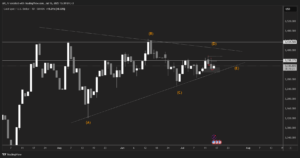The DAX is set to open 1.1% higher, rebounding from a 2-year low as the market mood improves. A speech from ECB’s Lagarde and several Fed officials could limit gains.
· GBP/USD rises from record low after BoE comments stem the selloff for now
· USD/CNH rises to an almost 2-year high on signs of Chinese economic weakness
· Oil rises from 9-month low on bets that OPEC+ could cut output
Recession fears and rising bond yields sent stocks on Wall Street and in Europe southwards yesterday. The Dow fell into a bear market while the DAX dropped to a new 2-year low. The FTSE managed to hold at the flatline, owing to the sharp selloff in the pound.
The pound and gilts got hammered as investors continued to fret over massive levels of unfunded spending being planned by Liz Truss’ government. A late in the day comment from Chancellor Kwarteng that more details on how the government will bring borrowing down will be released in November and a word from the BoE Governor Andrew Bailey that the BoE stands ready to raise rates if needed appear to have stalled the selloff for now.
GBP/USD is rising ahead of the European open, snapping a 6-day losing run. However, the pair still trades below 1.08 and remains vulnerable to USD moves.
Central bank speakers
Sentiment across the board appears to be in a slightly better place ahead of the European open. The runaway USD rally has paused for breath, and futures in Europe and on Wall Street point to a stronger start, but gains are likely to be limited as investors continue to fret over central banks hiking interest rates aggressively. The DAX is pointing to a 1.1% rise on the open, and Nasdaq futures rise 1.2%.
ECB’s Lagarde said yesterday that the central bank is likely to keep hiking rates over the next few meetings. Meanwhile, Cleveland Fed President Lorretta Mester said that the Fed should keep hiking aggressively saying that if there is an error to be made, it is best for the Fed to hike by too much rather than too little.
ECB’s Lagarde and Federal Reserve Chair Jerome Powell are due to speak today, which will keep central bank action in focus. US durable goods and consumer confidence could also shed more light on the state of the US economy.
Chinese yuan falls
Chinese factory profits shrank further in August amid continued disruptions from COVID lockdowns, the weakening yuan, and a power shortage that hit output. Profits fell 2.1% in the January – August period compared to the same period last year. This was the worst rate of industrial profits in 2 years and marked the second straight month of declines. While the broader market has brushed off the data, the Chinese yuan has fallen to a near two-year low.
Oil
Oil prices fell to a nine-month low in the previous session before ending the day on higher ground. While recession fears hurt the oil demand outlook, indications that OPEC+ could cut supply lifted the price. On Monday, Iraqi oil minister Ihsan Abdul Jabbar said that OPEC+ was monitoring the oil price and is keen to maintain balance in the market. He said neither sharp rises nor falls in the price were desired. Any further weakness in the oil price could see OPEC+ take action, cutting by more than the 100 bpd, the token cut in the previous meeting.
The lack of clarity over the planned EU price cap on Russian oil also supports the price. European nations are struggling to agree on imposing the price cap and could see the deal pushed back.
Disclaimer: This article is not investment advice or an investment recommendation and should not be considered as such. The information above is not an invitation to trade and it does not guarantee or predict future performance. The investor is solely responsible for the risk of their decisions. The analysis and commentary presented do not include any consideration of your personal investment objectives, financial circumstances, or needs.





